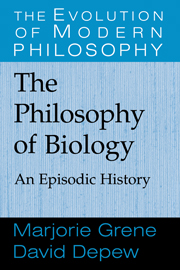Book contents
- Frontmatter
- Contents
- List of Figures
- Notes on Citations and References
- Acknowledgments
- Preface
- 1 Aristotle and After
- 2 Descartes, Harvey, and the Emergence of Modern Mechanism
- 3 The Eighteenth Century I
- 4 The Eighteenth Century II
- 5 Before Darwin I
- 6 Before Darwin II
- 7 Darwin
- 8 Evolution and Heredity from Darwin to the Rise of Genetics
- 9 The Modern Evolutionary Synthesis and Its Discontents
- 10 Some Themes in Recent Philosophy of Biology
- 11 Biology and Human Nature
- 12 The Philosophy of Biology and the Philosophy of Science
- References
- Index
1 - Aristotle and After
Published online by Cambridge University Press: 05 June 2012
- Frontmatter
- Contents
- List of Figures
- Notes on Citations and References
- Acknowledgments
- Preface
- 1 Aristotle and After
- 2 Descartes, Harvey, and the Emergence of Modern Mechanism
- 3 The Eighteenth Century I
- 4 The Eighteenth Century II
- 5 Before Darwin I
- 6 Before Darwin II
- 7 Darwin
- 8 Evolution and Heredity from Darwin to the Rise of Genetics
- 9 The Modern Evolutionary Synthesis and Its Discontents
- 10 Some Themes in Recent Philosophy of Biology
- 11 Biology and Human Nature
- 12 The Philosophy of Biology and the Philosophy of Science
- References
- Index
Summary
Beginning with Aristotle
It is no longer possible to begin an account of modern philosophy of physics in modernity itself; one must go back at least to the Middle Ages. In the case of philosophical thought about living things, however, or what has recently come to be called philosophy of biology, one must go back even further – to the figure of Aristotle, who lived in the fourth century b.c.e. (384–323). For one thing, Aristotle is the only major philosopher in our tradition who is also a major biologist. One cannot read him for any length of time without seeing that his central philosophical concerns were closely related to his biological interests. Moreover, Aristotle first raised the questions that have preoccupied philosophers of biology ever since: arbitrary imposition versus “cutting nature at the joints” when it comes to naming traits and classifying kinds of organisms; purposive function versus haphazardness and accident in the distribution of traits to various kinds; mechanistic reduction versus teleology or goal-orientation in the process of embryogenesis. These topics are all explicitly formulated in Aristotle's biological treatises, which comprise no less than a quarter of the corpus of his writings that have come down to us.
We must begin with Aristotle, however, not only because we find him raising issues that recur, but because Aristotle's biological way of thought forms the background of subsequent philosophy of biology.
- Type
- Chapter
- Information
- The Philosophy of BiologyAn Episodic History, pp. 1 - 34Publisher: Cambridge University PressPrint publication year: 2004

